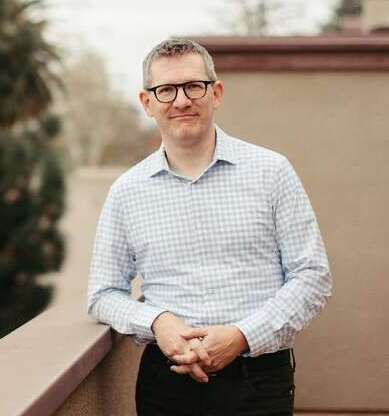With a hearty laugh and gentlemanly American cadences, Andy Crouch is a writer and thinker who makes the possibilities and perils of technology vivid and arresting.
He’s not the first to undertake such musings, of course, but as a recent conversation with Justine Toh on ABC RN’s Soul Search shows, his analysis is not only penetrating and profound but also hopeful.
With a background in classics, divinity and journalism, and the author of many books exploring cultural trends, Andy has a dazzling array of insights which he will unpack at CPX’s annual public talk, Richard Johnson Lecture, on September 1 in Sydney and in Melbourne on September 5. If you ever feel uneasy about your relationship with the devices in your life or dissatisfied with the world technology is creating for us, this is an evening not to be missed.
You will hear about the battle between God and Mammon – how technological progress follows the logic of the market rather than what is best for people. And how we can live better as human beings by deciding on the proper use of technology and so prevent these profit empires from running the show.
“I’ve lost some quantum of ability to move with purpose and force through the world.”
You will hear how we love technology because it puts us in what Andy calls the superpower zone – the world of power without effort. We press a button, things happen, and we feel exhilarated, even though we’re doing nothing. The problem is the benefits of this superpower do not include the development of our capacities.
“If I can get in my car and accelerate to a very high rate of speed, I never have to move my body with effort such that I actually become stronger and able to move faster on my own. In fact, quite the opposite. The longer I spend in my automobile, on an airplane, my body actually diminishes in its strength; for every hour I’ve spent in my car, I’ve lost some quantum of ability to move with purpose and force through the world,” he told ABC listeners.

Andy Crouch
In his new book, The Life We’re Looking For: Reclaiming Relationship in a Technological World, Andy invites readers to re-examine the bargain we make with technology so that we don’t give up on all its advantages but ask it to do something different so that we don’t remain in the superpower zone the whole time.
Describing a human being as a heart, soul, mind, strength complex, he says we are designed for love, rather than, say, tapping away at a keyboard. He draws a distinction between devices that don’t ask much of us and instruments that do demand a lot of us but also return something to us in the process.
“Devices replace and often displace human beings from doing things in the world. And sometimes they’re things we’d rather not do, so that’s okay. But they also, of course, leave us with nothing to do, so they leave us in the superpower zone of no development, no extension of ourselves; but there’s other kinds of technology that can be very high-tech, but they involve the human being often with these four qualities of heart, soul, mind, and strength in very deep ways in the world,” he said.
A shift from devices to instruments is possibly the most important development we can look for in the next hundred years of technology.
He gave, as examples, scientific instruments and musical instruments.
“My wife, Catherine, uses very advanced technology to probe kind of the properties of tiny cold things … But [this high technology] is used by people. It doesn’t operate on its own. It doesn’t replace people. It doesn’t put physicists out of a job. It, it gives them actually in some ways, harder jobs, more engaging jobs to actually extend our understanding of the world.”
As a pianist, Andy points out that the modern grand piano contains a lot of technology to create the tensions in the strings that create the powerful, resonant sound.
“But it’s not a player piano. It doesn’t play all by itself. It’s not a digital reproduction. It actually invites me to sit down and play. And I think we could ask a lot more of what are currently devices to be instruments. Instead, we could ask them not to replace us and displace us, but actually to properly place us with extended capabilities to explore, contribute to the world.”
He believes that a shift from devices to instruments is possibly the most important development we can look for in the next hundred years of technology.
As a counter to that hopeful vision, Andy is eloquent on the diminishing effect technology has on our relationships, which he describes as swapping a personal world for a personalised world.
He explains: “What it is to be a person is to be made for relationship and to be built with this kind of quest for relationship, but a personalised world is one that gives me a simulation – my device is paying attention to me; it’s paying closer attention to me than most people in my life do because it’s only listening for my voice and it’s always waiting for my touch and all that. But, of course, my device is not actually another person and it’s not really looking for me in the way that another person could be.”
“It never develops the sense that I’m actually known. And that actually reinforces the cycle of loneliness and shame.”
But here’s the rub: the digital world offers us much safer ways of feeling connected with less risk of disappointment and shame.
“They’re less adequate in the long run for our health. But they are much less risky … We approach our devices with more trust than we do other people now because the device is less likely, at least initially, to reject me, to judge me, to disappear from my life the way people can. So it’s partly out of the wounds of being human, I think, that the world of the digital becomes really appealing.”
This simulation of relationships has become so good since about 2012, he says, that it has had dramatic effects on adolescents, who are experiencing a dramatic increase in loneliness, anxiety, and depression.
“The shadow side of that is that, if I always turn to the screen instead of to a face, any given interaction with the screen is much more predictable, controllable, safe in a certain way. But of course, it never develops the sense that I’m actually known. And that actually reinforces the cycle of loneliness and shame.”
Andy has a wonderful vision of how the Western world can resist the power of Mammon by living in small communities where trusted friends live together and support each other.
“The reality is most of us cannot change these massive global systems, but we can change the circumstances of our immediate life to some extent.”
Andy says he framed his book partly by contrasting the Roman Empire with the way the first-century Christians livedin community.
“They didn’t have church buildings. They didn’t have institutions, they didn’t have access to any of that, but they could live differently in their homes, around their tables. And over a few hundred years, the community that started in those households changed the direction of the Roman Empire in unbelievably dramatic and decisive ways.
“Will that happen in an empire of Mammon? I have no idea. And will I won’t find out because it’ll be a multi-hundred-year project if it happens, but why not begin now because it’s going to begin.”
The 2022 Richard Johnson Lecture – ‘Disconnected: Why Technology Keeps Disappointing Us’ with Andy Crouch – will be held in Sydney on September 1 (at the Art Gallery of NSW) and in Melbourne on September 5 (at Melbourne City Conference Centre), from 7.30-9.00 pm. For more information or to book, head to the CPX website.
Andy Crouch will also be speaking at Bible Society Australia’s inaugural Bible Conference in Sydney (at the Powerhouse Theatre and online) on September 2 at 6pm. Christine Caine will also be speaking at the conference, as well as Simon Smart and CEO of Bible Society, Grant Thomson. Both in-person and online tickets are available for a donation. For more information or to book, visit Bible Society Australia’s website.
Email This Story
Why not send this to a friend?


